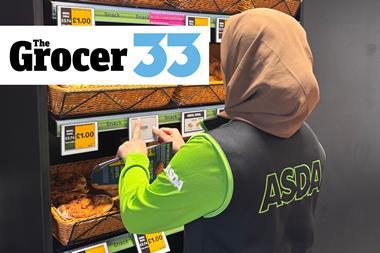The price of oranges and orange juice is rocketing due to reduced supply from the world's two biggest growing areas.
The commodity price of orange juice has jumped 112% in the past year and 16.9% in the past week alone to £1,547/tonne [Mintec] on the back of lower forecasts coming out of Brazil and Florida.
A one-litre carton of Tropicana now costs an average of £2 in the big four, up from £1.70 at the start of the year [The Grocer 33]. The ambient own-label orange juice price remains largely unchanged because of longer lead times in the production process, while the price of a single orange is now 36p, up from 29p in January.
The world's largest orange juice producer, Brazilian company Sucocitrico Cutrale, this month predicted its smallest crop for seven years after heavy rains wiped out large swathes of fruit crops. Its output would be down by at least 6%, it said.
Meanwhile, weather forecasters in Florida have warned hurricanes this summer would further impact supply.
That had led to traders being "spooked" and prices surging on the spot market, said Prag Mistry, managing director of importer Fruitmann. "We anticipate a significant upward adjustment in price when we step into July with the southern hemisphere supplies."
Prices for whole oranges would also rise, Mistry predicted, as the Spanish crop was still recovering after being hit by bad weather over the past two years.
Orange juice brand owners were being particularly squeezed between retailers and producers, according to the marketing director of a major juice brand. "There will be an inevitable hit on margins for manufacturers who can't mitigate the cost increases to shelf. In the short term it is the orange producers who can more easily raise their prices."
The British Soft Drinks Association has not ruled out price increases. "Orange juice is a natural product, with supply fluctuating for reasons we can't control, which means that changes in pricing are to some extent out of our hands," said a spokesman.
Brazil is the world's largest orange producer, followed by the USA. Latest figures from the US Department of Agriculture show American citrus crop this year is projected to be the lowest for a decade, with only 9.6 million tonnes expected. Last year the figure was 10.7 million tonnes and in 2001 it was 14.5 million.
A soft drink industry source said: "We are very concerned. While the full consequences haven't impacted our business yet, we will obviously be keeping a close eye on events."
The commodity price of orange juice has jumped 112% in the past year and 16.9% in the past week alone to £1,547/tonne [Mintec] on the back of lower forecasts coming out of Brazil and Florida.
A one-litre carton of Tropicana now costs an average of £2 in the big four, up from £1.70 at the start of the year [The Grocer 33]. The ambient own-label orange juice price remains largely unchanged because of longer lead times in the production process, while the price of a single orange is now 36p, up from 29p in January.
The world's largest orange juice producer, Brazilian company Sucocitrico Cutrale, this month predicted its smallest crop for seven years after heavy rains wiped out large swathes of fruit crops. Its output would be down by at least 6%, it said.
Meanwhile, weather forecasters in Florida have warned hurricanes this summer would further impact supply.
That had led to traders being "spooked" and prices surging on the spot market, said Prag Mistry, managing director of importer Fruitmann. "We anticipate a significant upward adjustment in price when we step into July with the southern hemisphere supplies."
Prices for whole oranges would also rise, Mistry predicted, as the Spanish crop was still recovering after being hit by bad weather over the past two years.
Orange juice brand owners were being particularly squeezed between retailers and producers, according to the marketing director of a major juice brand. "There will be an inevitable hit on margins for manufacturers who can't mitigate the cost increases to shelf. In the short term it is the orange producers who can more easily raise their prices."
The British Soft Drinks Association has not ruled out price increases. "Orange juice is a natural product, with supply fluctuating for reasons we can't control, which means that changes in pricing are to some extent out of our hands," said a spokesman.
Brazil is the world's largest orange producer, followed by the USA. Latest figures from the US Department of Agriculture show American citrus crop this year is projected to be the lowest for a decade, with only 9.6 million tonnes expected. Last year the figure was 10.7 million tonnes and in 2001 it was 14.5 million.
A soft drink industry source said: "We are very concerned. While the full consequences haven't impacted our business yet, we will obviously be keeping a close eye on events."


















No comments yet